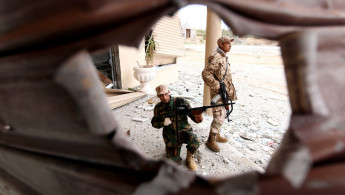Libya asks Arab countries to arm its military
The Arab League is holding an emergency meeting today to consider a request by the internationally-recognised government in Libya for airstrikes against the Islamic State group (IS) in Gaddafi's hometown of Sirte.
The Tobruk-based government also requested that the states of the Arab League equip its army to enable it to fight the IS.
The air forces of nine of the league's 21 currently active members are already involved in Operation Decisive Storm in Yemen in an effort to stop the Houthi movement spreading across the country from the north.
The Egyptian air force bombed Derna and Sirte in February of this year in response to the groups' beheading of 21 Egyptian Coptic Christians.
According to the Libyan army, the Egyptian air raids killed 64 IS fighters, and three of the group's leadership.
The Tobruk government's request for direct military assistance came as reports from Sirte indicated the IS had executed four members of a rival Salafi group and publicly displayed their bodies on gibbets during a revolt against their rule.
| The air forces of nine of the league's 21 currently active members are already involved in Operation Decisive Storm in Yemen. |
The revolt has now been brutally crushed, reports from residents indicating that as many as 70 people have been killed.
The governments of America, France, Germany, Italy, Spain and Britain issued a joint statement Sunday condemning the "barbaric" acts carried out by the IS in Libya.
The IS seized control of Sirte in February, exploiting the chaos and security vacuum in Libya to expand their control within the country.
A security vacuum
Libya has descended into chaos since the fall of former dictator Moammar Gaddafi in 2011.
The country is now divided between two rival governments and parliaments, and an assortment of Islamists, tribesmen and armed groups who are battling for control of cities and regions.
The internationally recognised government has been based in eastern Libya since losing control of the capital Tripoli a year ago to a rival group, which set up its own administration.
Both of Libya's rival governments have conducted air strikes against the IS in Sirte in recent days, but their capabilities are very limited, relying on outdated warplanes and helicopters from the Gaddafi era and lacking precision weapons.
Authorities in Tripoli, which was seized last year by a militia alliance known as Fajr Libya, announced last week the launch of an operation to liberate Sirte, 450 kilometres (280 miles) east of Tripoli.
Media loyal to the Tripoli authorities said warplanes were bombing armed groups linked to IS in Sirte.
The Libyan ambassador said the fighting erupted after IS assassinated earlier this week an influential imam from the powerful Al-Farjan tribe.
The jihadists responded by "massacring people, even killing people in their homes," Libya's ambassador to France, Chibani Abuhamoud, said.
Late Friday, the Dar al-Iftaa Muslim organisation that issues religious decrees issued a statement calling on Libyans to mobilise against IS.
"All Libyans able to carry weapons must mobilise to confront this cancer which is trying to destroy our Muslim nation," said the statement.





 Follow the Middle East's top stories in English at The New Arab on Google News
Follow the Middle East's top stories in English at The New Arab on Google News


